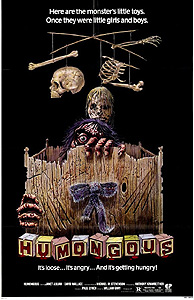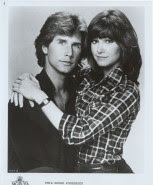The Toolbox Murders (1978)

The title The Toolbox Murders is now more famous because of Tobe Hooper's recent "re-imagining" of the old grindhouse flick. Not that I have anything bad to say about it. It's an amazing film that seemed to take Hooper back to his more primal instincts. And it was a bloody good time. But it's unfortunate that new-ish horror fans might not be aware of how differnt the original was. Not only that, but the original Toolbox is a damn fine film. It was awash with human emotions and even with all of the so-called brutality aside (most of which happens in the infamous first thrity minutes), Toolbox ups the ante by becoming something more. My friend, and co-reviewer, Michael Ferrari, said it best when he wrote about audiences not being prepared for what the film had to offer. Not that it was over flowing with violence, rather it's an acute character study on grief. And you'll be damned if you'll find another horror film like it, especially in todays white-washed PC cinema.
Review by
Amanda By Night
1978's The Toolbox Murders is a surprising film. Surprising because it lives up to it's ultra-exploitive title and because it also manages to be a study on the human condition. Yeah, you heard me... this movie is all heart. Sometimes the heart is broken and other times it's just ripped from one's chest, but all kidding aside, Toolbox is an anomaly,and more importantly, it's good.
The first 1/2 hour of Toolbox is a slice and dice extravaganza. Few films can boast such a brutal bodycount in so few minutes and for once,the movie is what you think it's going to be. Then it switches gears and becomes one of the most personal slasher films in the genre. Whether it was the writers' or the director's input, Toolbox becomes a very moving and fairly realistic look at loss and grief. Maybe I'm reading too much into it, but there's way more here than meets the eye here. On the surface, Toolbox is at once brutal and ugly while maintaining a highly underappreciated look at effectives of death on those left behind. While most 70s horror would be happy just to revel in the demise of its victims,Toolbox offers up other kinds of casualties as well. Practically everyone with a major part in this movie experiences some kind of loss,and inside of this loss is where the demons and or angels come forth. For the missing girl's mother, it's just to simply keep moving, for the brother, it's to take action even if it means getting in too deep. And for the killer, it's to exact the evil from the world; an evil he believes killed his little girl.
A good portion of the film dwells on the captive and the captor. It is here that we get to the meat of the story and the killer becomes both tragic and sad. Then there's a twist and everything you were lead to think is happening and once again Toolbox spins into a yet another descent into grief.
Shot in a matter-of-fact style, anyone who saw this movie when it first released in theaters or on vhs, probably remember the infamous bathtub scene best. It's a fantastically button pushing scene, and was even discussed on 60 minutes. But there's more here than just a voluptuous nude woman fighting for her life, but of course, if that's all you want, this movie is sure to satisfy you there too! What an interesting line Toolbox walks, and seemingly with ease. One of the oddest films to come out of a decade where odd was its middle name, The Toolbox Murders is a one-of-a-kind viewing that deserves a wider, more appreciative audience. 
Review by
Michael Jonathan Ferrari
Bit by bit by bit, back in the so-called decadent 1970s, filmmaker’s intentions were undoubtedly different from today. As we all know, ultimately all films are a business, and a return-on-investment is the absolute bottom line. But when comparing the films of then to today, there is a huge difference in the way a filmmaker expresses himself within those parameters. You get the sense that most first time directors today feel the need to cram as much as possible into their first films partly out of fear of not making another film, partly to be showy and cover all their bases—ALWAYS looking to get that next big gig. Low budget filmmaking of the 1970s was a time when you could find these quirky little films that end up sneaking up on you, cramming in some interesting subtext when and where you least expect it.
While re-watching Dennis Donnelly’s The Toolbox Murders, I couldn’t help but feel like I was missing out by not being as old as I am back then, enjoying this strange little film in it’s first run in 1978. The picture came out at a time right when the Slasher film genre as we know it today was about to bust wide open with the release of John Carpenter’s Halloween, some 7 months later. Audiences in March of ‘78 walked into the film because of it’s exploitation-esque title expecting some blood and guts, and they walked out with exactly that and something else more curious... Donnelly, an Episodic TV show veteran, crafts a film that always plays with your expectations. The first half hour of the film piles on several murders, seemingly one after the other after the other. Your mind can’t help but wonder if the film is just going to be scene after scene of pointless mayhem, and then suddenly the violence stops and the typical sleuthing aspect of slasher films kicks in. It is also at that point where the film shifts gears completely. The killer is quickly revealed and becomes more of the focus of the story and we as the audience are held captive, much like Pamela Ferdin’s prophetically named final girl Laurie, and in the film’s greatest and most shocking scene... we are simply forced to sympathize with and understand his intentions, while fearing for Laurie’s life.
Discussing this picture with others I often hear that at this point the film is mostly lost on them. While I will agree that it slows down tremendously, I don’t believe at fault to the film. It’s at this point where the film is most alive. Films nowadays make it bit more fashionable to sympathize and accept villains in more substantial roles. Rob Zombie has certainly made a career of it. Recently Kevin Costner got his own chance to shine in Mr. Brooks playing the title character’s sympathetic serial killer role. TV has it’s fare share of it as well, most notably, Showtime’s Dexter. Though back in 1978, most mainstream films stayed away from the concept. It was in rare exceptions, usually in low-budget films, where the despised (usually) obscured madman got his chance to unleash his anguish through the simple act of communicating verbally with another. Some sort of personal tragedy is the jumping point for this macabre bunch, and cold-blooded, calculated murder is almost only their true way of expressing their anxieties.
The Toolbox Murders ends up being more than just a wallow into a man’s psyche as the film’s pace picks up and a little twist is thrown in for good measure. The film’s final scene is decidedly very 70's in it’s refusal to end on a false upbeat note. You walk away feeling more than you thought you would for characters in a film of its ilk. I personally wondered where things went wrong starting in the 80's as films depreciated with each year, characters in the genre increasingly became less dimensional and more annoying than anything else. Risk seemed to be something that comes up a lot. As the years go on, more and more films play to the audience instead of against it. Studios, Producers, Writers and Directors, well-established or not, seem to want to impress as many as possible instead of intrigue the few who actually get that humans even when presented in art, can be complex and not summed up in a 5 to 7 word sentence.
Recently I saw a friend of a friend’s “independent” film that boasted an all-star cast of actors desperately trying to prove they can act and play “dark” and more complex-than-usual characters. You know, a notch above cardboard cut-outs. It was depressing and a reminder that honesty is the one thing left out of most movies today. Once and awhile you’ll see that honesty, and it’s those films I welcome with open arms. To me, instead of calling a decade like the 70s “The Golden Age” I’d rather call the occasional good, honest film to come out of any given decade...golden.
The Toolbox Murders is exploitation with that golden something extra, it’s a great little film that reminds us that the only real way to enjoy films, especially those of a formula, is to keep an open mind and hopefully you’ll find a film that surprises you once in awhile by unexpectedly taking you on your journey a little off-road..You know, that wacky and weird place where you’d less suspect before arriving at your final destination. It’s a groovy thing.





